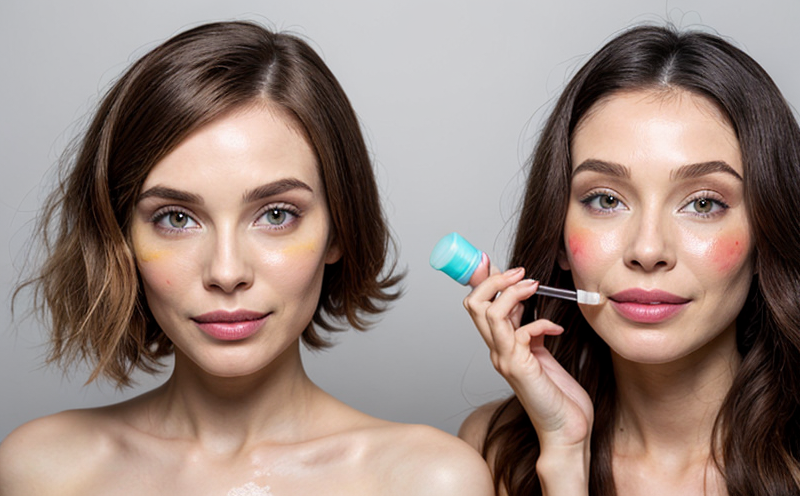Natural Colorant Stability Testing in Cosmetics
The natural colorants used in cosmetics are derived from natural sources such as fruits, vegetables, and other plant-based materials. These colorants play a significant role in enhancing the aesthetic appeal of cosmetic products while offering consumers an eco-friendly alternative to synthetic colors. However, the stability of these natural colorants is crucial for ensuring consistent product quality over time. Stability testing helps manufacturers understand how these ingredients behave under various environmental conditions, from storage temperature and humidity levels to exposure to light.
Natural colorants are susceptible to degradation due to their inherent chemical composition and the presence of enzymes found in cosmetic products. This can lead to changes in color intensity or hue, which is undesirable for consumers. To maintain product quality and meet regulatory standards, it is essential to conduct thorough stability testing during the product development phase.
The process involves exposing samples of the natural colorants to controlled environmental conditions that mimic real-world scenarios. Laboratories like Eurolab use advanced analytical techniques such as High Performance Liquid Chromatography (HPLC) and Spectrophotometry to measure changes in color intensity and hue over time. This data provides insights into the stability of the colorant under different storage conditions.
Understanding natural colorant stability is vital for several reasons. Firstly, it ensures that products meet regulatory requirements, such as those set by the European Union’s Cosmetics Regulation (EC 1223/2009). Secondly, maintaining consistent product quality enhances consumer trust and satisfaction. Lastly, stable colorants contribute to a more sustainable production process, aligning with modern eco-friendly practices.
By conducting stability testing early in the product development cycle, manufacturers can identify potential issues and address them before launching their products into the market. This proactive approach not only saves time and resources but also ensures that the final product meets both quality and regulatory standards.
- Precision: Accurate measurement of color changes using sophisticated analytical techniques.
- Consistency: Ensuring consistent results across different batches and storage conditions.
- Regulatory Compliance: Meeting the stringent requirements set by regulatory bodies worldwide.
- Sustainability: Supporting eco-friendly practices through reliable testing methods.
Why It Matters
The importance of natural colorant stability in cosmetics cannot be overstated. A stable colorant ensures that the final product remains visually appealing and consistent throughout its shelf life, which is critical for maintaining consumer trust and satisfaction. In a highly competitive market, these factors contribute significantly to brand reputation and customer loyalty.
Moreover, unstable colorants can lead to legal issues if they fail to meet regulatory standards. Non-compliance with regulations such as the European Union’s Cosmetics Regulation or similar international standards could result in product recalls, fines, and reputational damage. Therefore, it is imperative for manufacturers to invest in robust stability testing protocols.
Stability testing also plays a crucial role in ensuring that products are safe for use. Natural colorants derived from plant-based materials can sometimes contain allergens or irritants. By conducting thorough stability tests, manufacturers can identify any potential risks associated with the colorant and take appropriate measures to mitigate them.
In addition to regulatory compliance and safety, stable natural colorants contribute to a more sustainable production process. As consumers increasingly demand eco-friendly products, manufacturers are under pressure to reduce their environmental impact. Using stable colorants helps minimize waste and reduces the need for frequent formulation adjustments, thereby contributing to a greener supply chain.
Lastly, stability testing is an essential tool in product development. It allows manufacturers to refine formulations, optimize ingredient combinations, and improve overall product performance. This iterative process ultimately leads to better quality products that meet market demands while staying competitive in the industry.
Eurolab Advantages
At Eurolab, we pride ourselves on providing top-tier testing services for natural colorant stability in cosmetics. Our team of expert scientists and technicians are dedicated to ensuring that each test is conducted with precision and accuracy. With state-of-the-art equipment and a commitment to innovation, Eurolab offers unparalleled quality control solutions tailored specifically for the natural & organic cosmetic industry.
Our comprehensive approach includes not only laboratory testing but also consultation services aimed at helping manufacturers make informed decisions regarding their product development processes. Whether you need assistance with selecting appropriate colorants or optimizing your formulations, our team is here to support every step of the way.
In addition to providing reliable data and expert advice, Eurolab ensures that all tests comply with relevant international standards such as ISO, ASTM, EN, IEC, etc., ensuring that you meet global regulatory requirements. Our rigorous quality control measures coupled with our commitment to excellence make us your ideal partner for natural colorant stability testing.





